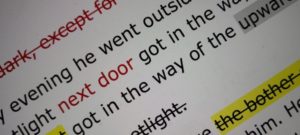
Woodrow Wilson was once asked how long it took to prepare a speech.
“If it is a ten-minute speech it takes me all of two weeks to prepare it; if it is a half-hour speech it takes me a week; if I can talk as long as I want to it requires no preparation at all. I am ready now.”
In today’s online world where every individual and corporation and, sadly, every marketer has become a self-appointed instant publisher, the inaccessibility of stories and ideas for the audience has become more and more common. With rambling prose and butchered language, our new publishers prolifically push forward into the Twittersphere and the Webscape a bit like emperors proudly parading with no clothes.
Without usually taking sufficient time to draft, re-draft and edit, we dash off important emails to clients, publish our corporate whitepapers to generate sales leads, tell stories of our brands that would be indistinguishable from competitors if we removed the brand marks, we post stream-of-consciousness ramblings on our blogs, and create video narratives without form or function.
The most important task in the online-social world is to publish regularly, be seen, have a presence, capture eyeballs, track and report click-through rates.
Not exactly.
Paying more attention to words, story structure, rhythm, flow, context and elements of engagement in storytelling are more essential than they’ve ever been. You cut through the online clutter with quality narrative. These skills can be learned and practiced by anyone in the self-publishing world – or, you can hire proven writers and editors to smooth out the rough edges.
The process of improvement in our storytelling takes a little more time than most of us invest in our fast-moving, tactic-driven world, even though such investment is critically important to create engagement with the audience. Just publishing isn’t good enough. You must take the time to properly craft the story – or you can contract it out to skilled writers and editors.
A few centuries ago philosopher John Locke understood this about his own writing (with a little modern language added): “Parts of it might be contracted: the way it has been written, by catches, and many long intervals of interruption, being apt to cause some repetitions. But to confess the truth, I am now too lazy, or too busy to make it shorter.”
Locke could have used a good editor.
Shorter is better in the online world. You have only seconds to catch the reader or viewer. A click statistic does not equal engagement.
In the world of print journalism, one of the icons of effective writing was the late Don Murray, a Pulitzer Prize winner, Boston Globe writer, an editor for Time, and author of more than a dozen books.
Murray believed brevity in writing creates vigor and clarity. “The more complicated the subject, the harder to understand, the more important it is to use the shortest words, the shortest sentences, the shortest paragraphs that communicate the meaning without oversimplifying and distorting it.”
Ann Handley’s book, “Everybody Writes: Your Guide to Creating Ridiculously Good Content,” offers a wide range of advice for those who want to write more effectively in the online world. Chapter 24 is titled: “Hire a Great Editor.”
Handley notes there are three types of editors – copyeditors/proofreaders; substantive editors; and line editors. She says copyeditors are easy to find, substantive editors less so, and line editors even less so. Copyeditors “clean up messy style issues, punctuation, typos, misspelling, and so on.” Substantive editors “give a piece of writing a higher level read and offer suggestions on how it might be improved.” Line editors “comb through a piece to correct grammar, word choice, and paragraph and sentence flow – while doing a good deal of rewriting as well, all without overwhelming a writer’s voice.”
Good line editors are the most difficult to find, she notes, and when you find one “…hold on to him or her, get married if you must. And then if your friends ask whether you know a good editor, don’t give up the name. Simply shrug and change the subject.”
“Our online words are our emissaries; they tell our customers who we are,” her book jacket blurb notes. “Our writing can make us look smart or it can make us look stupid. It can make us seem fun, or warm, or competent, or trustworthy. But it can also make us seem humdrum or discombobulated or flat-out boring.”
So, how are you and your company looking out there in the online world? If you are coming across a little like the emperor leading the parade with no clothes, you might want to hire a tailor who knows how to sew fabric with real thread.